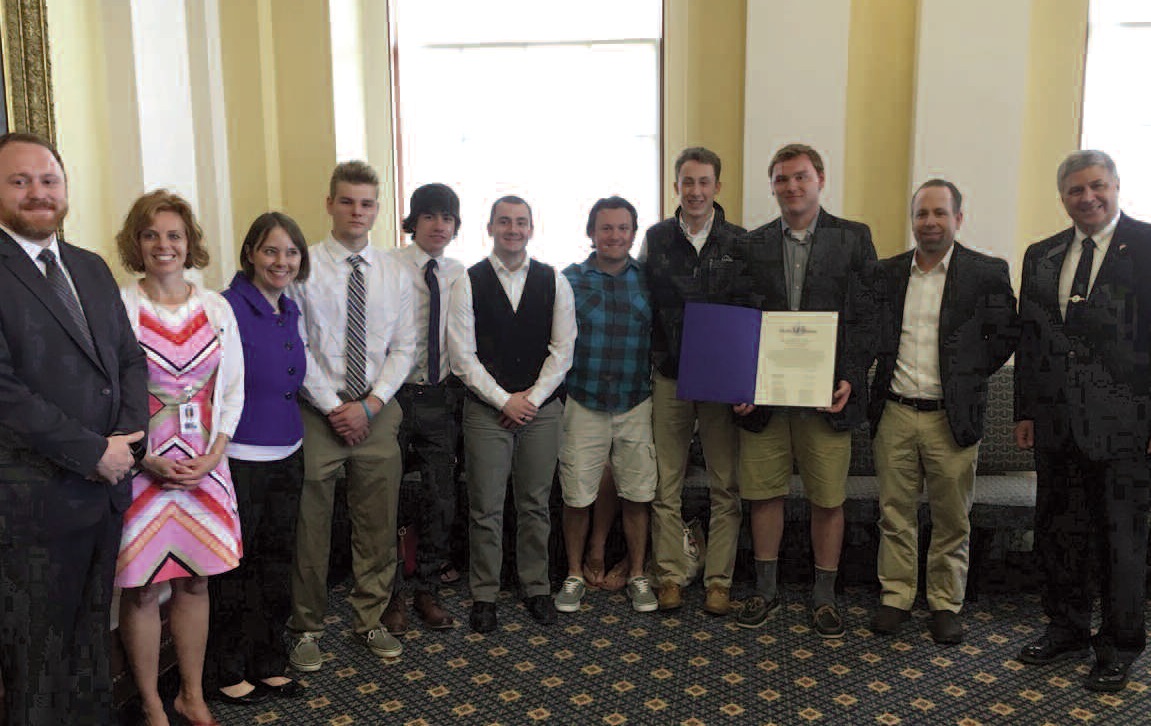
Gary Kennedy, right, started visiting the local prison in Trece Martirez, Cavite, a couple of years ago and found the need for education which required books and a teacher. Here he is shown with the prison teacher. Photo courtesy of Gary Kennedy
Kennedys fortify previous Rotary projects
Gary Kennedy, of Chelsea, past president of the Rotary Club of Hallowell has returned from a humanitarian journey to Southeast Asia. His mission was to fortify a previous Rotary project which was a medical facility in the village of Amadeo Cavite, Philippines. The facility was started a few years ago and Gary has been visiting this site annually to distribute medical supplies and equipment. Most of these supplies are purchased from Partners for World Health. Gary’s brother Charles, who is a Rotarian from the Windham Rotary Club, decided, with the support of his club, that he would join Gary two years ago. Together and with the strength of Rotary they have been able to accomplish some really great things and have plans for more. This year alone a library, started by Rotary and Kennedy brothers, was replenished. The medical clinic was given medical supplies and equipment valued at approximately $17,000.

Charlie, left, and Gary Kennedy have joined forces to help the impoverished in the Philippines.
Also a new orphanage which was started by a pastor from Pennsylvania, which was in need of help, asked the Kennedy’s at a meeting in Silang, Cavite, if they could help. The orphanage needed six bathrooms for the boys and girls and there were no funds available to work with. Charles and Gary came back to the U.S. and, with the help of Mike Cloutier, manager and golf pro of the Sebago Lake Golf and Country Club, had a golf tournament which produced enough revenue to fund the needed bathrooms of the Mango House Orphanage in Silang. There are so many people with big hearts; you just have to find them.
The Kennedy’s are both retired, disabled American veterans of the Vietnam era. They find the work of humanitarians the most rewarding job they have ever had. “Once you start you are hooked,” said Gary. “You end up with a piece of the world as your family. There is so much warmth in doing this.” Gary has been doing this for a lot longer than his younger brother so he has been able to see children go from kindergarten to college, and all it took was a little help and a gentle push to replace guns with books.
The Philippines will have hundreds of cleft lip repairs and many sick and hungry receiving food and medicine. Next year they will even have their first horseshoe tournament, one of Gary’s brain storms. Gary says, “If you fill a life, not only a stomach, you can change the world. Boredom is a void that needs to be filled or it festers and the result is all bad.”
Gary started visiting the local prison in Trece Martirez, Cavite, a couple of years ago and found the need for education which required books and a teacher. Gary and Charlie were able to raise several hundred educational books for a new library inside the facility. Gary promises he will give them books shelves this year. He doesn’t know how yet but he is convinced that it will happen.
Besides books, medical and dental equipment, the Kennedy’s are looking for baseball equipment to start two teams. So, if you have any of this sort of thing hanging around your attic, give it new life and donate it. “Adopt a team and we will share the pictures with you,” said Gary. “It’s great doing something for others that they can’t do for themselves. It’s life changing for you both. This is also a wonderful project for church and youth groups.”

Pennsylvania native Ada, the director of the orphanage in the Philippines that the Kennedy’s were instrumental in constructing. Ada and her husband had traveled to the Philippines many times, but when he passed away, Ada stayed to run the orphanage, and has not returned home. Photo courtesy of Gary Kennedy
The Kennedys would be happy to speak and share with your group what they do. Gary is a member of Rotary and Knights of Rizal. He has received a couple of Paul Harris Awards as well as the President’s Call to Service Award for thousands of volunteer hours. He was awarded honorary citizenship of the Province of Cavite Philippines, by Governor Ayong Maliksi, for his many years of service to the poor of Cavite. He also has many other awards given to him by many different groups in Asia.
You can call or text message Gary at 458-2832.







